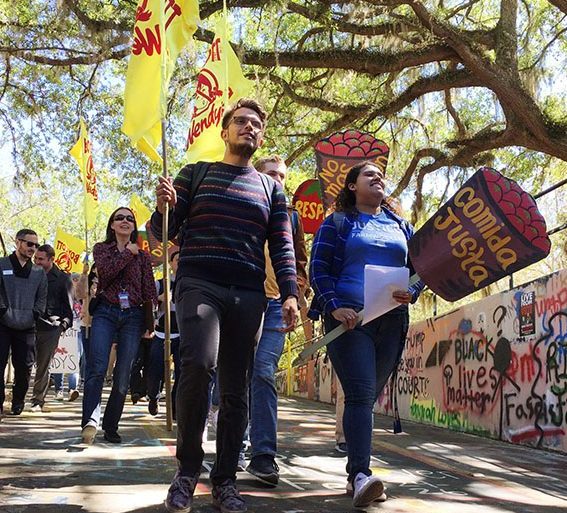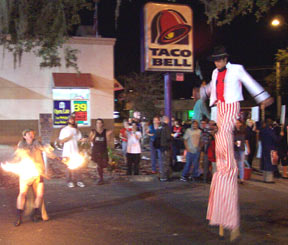
Florida Gators, proud of the state’s homegrown Fair Food Program, are fighting for University of Florida to kick Wendy’s off campus.
Will this be the year that Florida’s flagship public university and agricultural school finally demonstrates support for the world-renowned social responsibility program in its own backyard?
For the finale of the upcoming “4 for Fair Food” Tour, the Coalition of Immokalee Workers and allies from across the South will be converging on Gainesville, Florida, home to the state’s largest and most prestigious educational institution, the University of Florida. Home to over 53,000 students, the sprawling UF campus is one of the state’s crowning academic jewels, ranked among the top 10 public institutions of the U.S., and this year, the administration is aiming to reach the top 5.

From the earliest – and we mean earliest – days of the Campaign for Fair Food in 2001, students from the University of Florida have stood with the CIW, hosting some of the most powerful, and creative, actions in the Taco Bell Boycott (which you can see for yourself from one of the stunning photos, here on the right, from a 2002 Gainesville protest replete with stilt walkers and fire dancers!). Florida “Gators” were among the founders of the Student/Farmworker Alliance (SFA) nearly twenty years ago. Today SFA has become a national force from coast to coast in the fight for Fair Food – and, of course, is the driving force behind the Boot the Braids Campaign to have Universities disassociate themselves from Wendy’s, the only major fast food chain not to support Fair Food!
With not one, but two Wendy’s on campus, UF students launched their campus-wide Boot the Braids Campaign five years ago, organizing colorful action after colorful action across the school’s sun-filled campus and marching to the Reitz Union, where the main Wendy’s is nestled in the school’s food court.
Yet despite the strong and growing protest movement on campus, the President’s office has not once in five years agreed to sit down with students to hear their urgent concerns about Wendy’s unconscionable behavior.
This year, the 4 for Fair Food Tour will be bringing the full force of the Fair Food movement to UF’s doorstep: farmworkers and their families from Immokalee on the official cross-country tour, fresh off of visits to Chapel Hill, Columbus, and Ann Arbor; caravans from cities across the south; and more farmworkers and their families from Immokalee, who will be taking advantage of spring break that week to bring their children and youth to the finale of the 4 for Fair Food Tour!
When: March 14th, 12:30 PM
Where: Norman Field, 1200 SW 8th Ave, Gainesville, Florida
Register here!
Contact: Uriel Perez, uriel@allianceforfairfood.org
What could explain the University of Florida’s resistance to the Presidential Award-winning Fair Food Program? The dark history of the UF agricultural program and farmworkers’ human rights…
The fact that UF has managed to ignore the well-documented exploitation and abuse of farmworkers for generations may have an explanation. Perhaps the most widely-recognized and influential department at the University of Florida is the Institute of Food and Agricultural Sciences (IFAS), a research and teaching institution that is intimately connected to Florida agriculture, providing cutting-edge research, resources, and freshly-trained leaders for the industry.
IFAS’s mission, according UF’s website, is as follows:
The Mission of UF/IFAS is to develop knowledge in agricultural, human and natural resources and to make that knowledge accessible to sustain and enhance the quality of human life.
However, UF/IFAS has displayed a deeply troubling failure to live up to its own mission for decades – especially when it comes to the quality of farmworkers’ lives. Even as the Institute carefully crafts more flavorful tomato varieties and works tirelessly to develop cures to major ailments facing Florida’s primary crops, the school has shown a shocking disregard for the human rights abuses that have long plagued the industry. Decades of headlines of forced labor and sexual violence in Florida agriculture have come and gone — from the seminal Edward R. Murrow documentary “Harvest of Shame” in 1960 to PBS’s Frontline documentary “Rape in the Fields” in 2013 — without so much as a peep from IFAS. Indeed, the primary manner in which IFAS has acknowledged farmworkers is in terms of labor supply, considering workers solely insofar as they are sufficiently meeting (or failing to meet) the labor needs of the industry, rather than recognizing that those men and women who harvest our food are just as much a part of the “human life” to which IFAS dedicates its mission as the farmers and the consumers who enjoy the benefits of farmworkers’ hard labor.
Sadly, indifference is in fact IFAS’s best look when it comes to farmworker poverty, because on the few occasions over the years when the institute has been asked to comment on the CIW’s human rights efforts, the results have not been pretty. Here are some typical quotes from IFAS’s Fritz Roka, the institute’s representative any time a quote is needed on the CIW:
- 2000, Naples Daily News, in response to the CIW’s March for Dignity, Dialogue, and a Fair Wage: “As long as workers are willing to get on the labor pool bus at a certain rate, who are we to say that’s unfair? To say that workers aren’t getting paid enough is to get into value judgments… What’s a living wage to me is different than from an 18 year old male. I think that’s best left to the market, with the big provision that people can make choices.”
- 2008, NPR, in response to the CIW’s Burger King campaign: “Farm work is never going to compensate people to a point where we can, as a general society, feel good that they’re making a sufficient amount of money.”
- 2010, in a paper on “Labor Issues Confronting Florida Tomato and Orange Growers” and the CIW’s Campaign for Fair Food: “A second, a more substantive, question is whether the retail buyers will continue to buy tomatoes from south Florida growers at the same, if not greater volumes. Economic incentives will push buyers over time to shift their tomato purchases to other areas where a penny-a- pound is NOT paid, including off-shore production areas. Hence, the long term benefits to the south Florida tomato industry and its workers’ economic welfare are questionable.”
In other words, it has been IFAS’s public position that not only will poor farmworkers always be among us, but any efforts to address farmworker poverty and abuse stand to negatively affect Florida’s ability to compete in the marketplace and will harm the agricultural industry as a whole.
Even after the Fair Food Program proved all those grave predictions wrong and transformed Florida’s tomato industry from “ground zero for modern day slavery” into “the best working environment in American agriculture,” Florida’s leading agricultural university kept its stony silence, refusing to acknowledge, much less support, the efforts of farmworkers to improve working conditions in the state.
As the history of the Boot the Braids Campaign illustrates, the University of Florida’s leadership – especially that of its flagship program, IFAS – has fallen woefully behind the times. But even in the absence of the school’ support, UF’s students have fully embraced the Fair Food Program and the CIW’s work, recognizing the Fair Food movement as another precious jewel in the state’s rich agricultural history.
It’s long since time for the administration at UF to catch up with its students. In cutting into Wendy’s ability to operate with impunity while ignoring the plight of farmworkers, the University of Florida could begin to right the wrongs of its own history, building towards a future of not only Florida’s agricultural industry, but that of the nation, in which workers’ basic dignity is respected.
